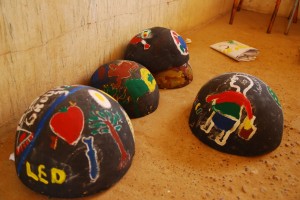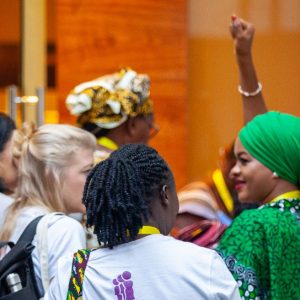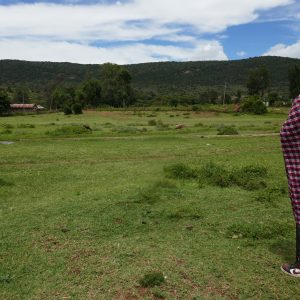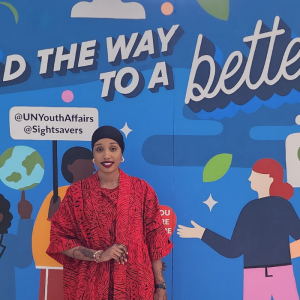Social Change in Aere Lao
It has been a quiet start to the morning. We had all arisen after another night’s sleep interrupted by the sheer heat of the region, the tour group ending up sleeping on the ground outside. After a quick breakfast of some French bread and sweet green tea, we were on the road again to Aere Lao – third destination in the Senegal section of Sister Fa’s tour. The journey was quick, forty minutes along the potholed road. We headed straight to the Mayor’s office to brief him on the day’s activities before heading to the school to start work for the day. That was the intention at least…
In a conservative region, Aere Lao stands out as a town where female genital cutting is more entrenched than most. Tostan works on the basis that a community invites the programme to work with them, it is never imposed. This of course means that a range of factors often affect whether a community participates – issues like power relations among community members have a great deal of influence. Tostan had started work in Aere Lao in 1999 but intra-community relations had led to a premature end to the Community Empowerment Programme. FGC is such a taboo topic that in some instances some community members (in most cases a very small proportion) refuse to countenance any discussion of the topic. Since then Tostan had been unable to return.
It was with this backdrop that Abou Diack, Tostan’s Regional Co-ordinator suggested to Sister Fa that she visit Aere Lao while on tour, principally to reach out to the local youth who may not have had the chance to hold an informed debate on human rights and FGC. This was endorsed by the school’s Principal and the regional Government Commissioner. It was not endorsed however by some community members with disproportionate levels of influence, and by extension the Mayor of Aere Lao. The Mayor refused to allow the activities to take place in his community, citing the trouble he would endure should he allow it; for some time a local group of men with a high level of influence had been blocking any activities that related to FGC and the Mayor had decided he did not wish to upset them. Despite Sister Fa and tour manager Bebe’s protests, he was not moved to change his mind.
Leaving the office, Sister Fa made a judgement call. The Principle of the school had still given his permission for her work to continue within the school, and as a Government civil servant this carried weight. Given that the Government appointed Regional Commissioner for the Fouta (a far senior official to the Mayor) also gave his approval to continue, the decision was made to carry on with the programme. The team departed for the school and began the day’s classroom activities, discussing the ideas of universal human rights with the class. As with all of the other destinations, the children were well prepared and well informed, engaging with the activities.
It was not too long before the word had spread locally. A group of fifteen young men marched into the classroom, under instruction from those with an interest in disrupting proceedings, and lined up at the back of the room while remaining silent. Sister Fa has a very simple approach to discussing FGC in classrooms. She will not bring the topic up herself, ever. Rather, she introduces human rights and waits the issue to come up naturally, which it inevitably does. Sister Fa resolved to continue the class, refusing to be intimidated. The issue of FGC soon arose and at this point the protest group sprang into life. Placards were unveiled and shouting began. Sister Fa was not deterred, she worked to calm her team down and start a discussion with this group.
Although initially successful, it was clear that the group of young men were not interested in dialogue about the practice. Eventually the classroom students, some of whom were relatives to the protestors, began to shout for the gang to leave. They surrounded Sister Fa, jeering and whistling the group at the back of the class who reacted by trying to scrap with the students. Teachers soon broke this up but Sister Fa had taken the decision already to finish the class, for the safety of the students. Afterwards, she said, ‘I would happily sit in that classroom all day, and I stood up to those men because I believe that what I say is right. If they have arguments, fine, they can bring them. But by resorting to violence they have shown that they are weak and their arguments are weak.’
We left Aere Lao later that day after lunch, cancelling Sister Fa’s planned concert. It was not long however before messages of support began to flood in. Students and teachers were texting team members and stopping by the house where we were eating our food, to show their support. Telephones began to ring with journalist calls, sympathetic to the cause and determined to shine a light on the disruption that had taken place. Sister Fa is a star in Senegal, so this was never likely to remain unreported. Soon, reports started to arrive that the teachers and students had marched to the Mayoral offices to protest the actions of the men. Further news then came that the men were themselves paid to disrupt the classes.
Visiting the Regional Commissioner the following day, he pledged his support to Sister Fa and Tostan’s work and made it clear that any resources that she might need on her return, she would have. Of course, Aere Lao did not represent the end of the tour, and the final day was in many ways the greatest success, with over 2,000 turning up to the concert in Podor. Yet it should be considered that the work in Aere Lao was of equal importance. Sister Fa was able to speak to over 200 children and teenagers about FGC in a community that would not otherwise address this. Add in the profile raised through media coverage and the accumulated message of support that show how well her message was received, and it is plain to see the impact of Sister Fa’s work.
If ever an indicator of the challenges that exist for the work being done to end FGC, Aere Lao was it. It is through the determination of people like Sister Fa and the Tostan Social Mobilisation teams that the topic of FGC can be raised where it would otherwise not.








